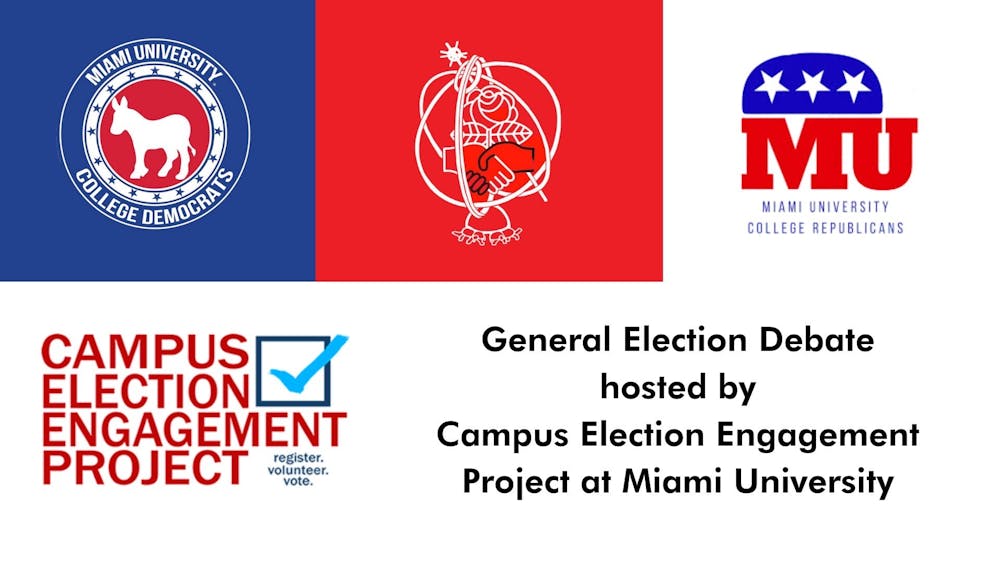Last week, Miami University's Campus Election Engagement Project (CEEP) hosted a virtual debate between Miami University College Democrats (Dems), College Republicans (CRs) and Young Democratic Socialists of America (YDSA) over current issues ahead of the 2020 election.
The debate was moderated by Victoria Villaneuva, a CEEP member, and Ethan Stack, an Associated Student Government (ASG) senator.
Questions were divided into three segments: coronavirus response, domestic issues and presidential candidates.
Villaneuva first asked representatives from the three groups their opinion on the White House's handling of the pandemic and asked Dems and CRs how their candidate would help America post-pandemic.
Hunter Wells, a Dems member, said the Trump response to the pandemic has been marked by failures.
"The greatest downfalls of Trump's coronavirus response was failure to properly educate the public, distribute tests to identify the numbers and locations of the virus and enforce policy to prevent further spread," Wells said.
Michael Vestey, a YDSA representative, said the country’s issues are deeper than just the pandemic.
"The biggest issue is that America was set up to fail by our previous administrations, our previous governments and our history," Vestey said. "There is no functioning, widespread healthcare system that is accessible to anybody, anytime."
Chairman of CRs Taylor Armstrong opposed Wells and Vestey. He said Trump worked to control the pandemic.
"The President listened to Dr. Fauci and Dr. Birx and the coronavirus task force in a request to shut down the economy and shut down the country in order to learn more about the virus and to ensure that any spike [wouldn't] overwhelm our healthcare system, the list just goes on," Armstrong said. "At the end of the day, this is about making sure that we can live our lives in the new era of COVID-19."
Moving on from the pandemic, the moderators asked whether Trump should fill the Supreme Court vacancy left by Justice Ruth Bader Ginsburg's death. While CRs said Trump should fill the opening since he is still in office, both Dems and YDSA were against it, with YDSA treasurer Shelby Rice calling it "laughably hypocritical" considering the Obama administration was not able to fill a Supreme Court position left vacant in 2016, also an election year.
The three groups were asked what or who they believe is the biggest threat to national security. CRs argued that China was the greatest threat.
Enjoy what you're reading?
Signup for our newsletter
"China is the biggest threat to security, and I'd go so far as saying that they are the new evil empire," said Theo DeRosa, a member of CRs. "In recent decades, the world order has accepted them with open arms, even after the atrocity committed at Tiananmen Square. They've been allowed to join the World Trade Organization, and they've developed influence across the world."
Omar Elghazawi of Dems acknowledged the dangers of some foreign powers, but he said white supremacist organizations pose a greater threat.
"There are, of course, foreign nations that are threatening the United States right now,” Elghazawi said. "But white supremacy is the only one of these threats that is directly in our nation and directly involved in our government, working to advance white supremacist ideals. Groups like the Proud Boys and Patriot Front are allowed to form across the nation, especially in our college campuses as we've seen here."
The C.I.A has found that foreign influence is probably affecting the United States government and the election process, although according to the agency’s analysis, it is Russia, not China, that is the most prominent perpetrator.
Rice agreed with Elghazawi’s sentiment about white supremacy. She cited statistics from federal intelligence agencies to further her argument.
"White supremacists and other right-wing groups are absolutely the greatest source of politically-motivated violence," Rice said. "That's from the Center for Strategic and International Studies and from FBI reports. From 2009 through 2018, the far-right has been responsible for 73% of domestic extremist-related fatalities."
While we couldn’t find this information from the Center for Strategic and International Studies or the FBI, The Miami Student was able to find a study from the Anti-Defamation League, a non-governmental organization dedicated to countering anti-semitism, with this statistic.
Later, the moderators asked CRs whether the President's taxes were relevant to discussion. CRs responded that Trump’s taxes were not relevant and that, before being elected, he used loopholes allowed by the Obama-era tax code to avoid paying federal income tax.
From there, each organization was given a minute to make closing statements.
First, YDSA encouraged becoming active in one’s own community. Regardless of the outcome of the election, Vestey said, "We have the chance to stand together and build a country that works for all of us."
Armstrong said while many solutions may sound good on paper, they won't put money in the pockets of the American people.
"We have got to pursue policies and choose candidates, frankly, for the White House that will apply realistic, practical and applicable policies that are going to be able to improve the lives of the American people," Armstrong said.
Finally, the Dems repeated that the election was about livelihoods and said that the nation needs a president that will put them back onto the right track.
"Obviously, Joe Biden is far from a perfect [candidate]," Elghazawi said. "Many in our club did not support him and, at the end of the day, he's not the candidate that many of us wanted. But the most important thing that we need to do right now is take away a president that promotes white supremacy and promotes hatred in such a way that he has made it a normality in this country."




